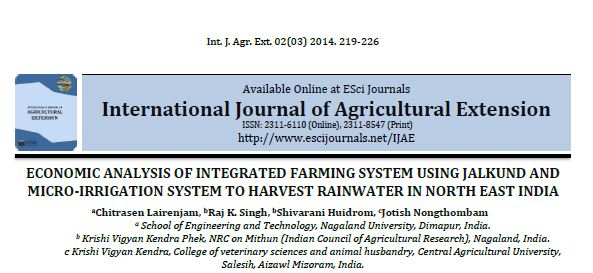ECONOMIC ANALYSIS OF INTEGRATED FARMING SYSTEM USING JALKUND AND MICRO-IRRIGATION SYSTEM TO HARVEST RAINWATER IN NORTH EAST INDIA
The North Eastern Hilly (NEH) region of India is characterized by varying topology that is largely affected by high seepage flow and flash runoff. Dual effect of water in the form of heavy rainfall during monsoon and water scarcity during post monsoon is severe in this region. Existing undulated terrain and dual effects of water are the main limiting constraint in storing/ concentration of runoff water and its later use for irrigation purposes in NEH region. There has been an increasing interest in low cost Water Harvesting and Micro-irrigation system for small scale farming practices. Traditional farm ponds practiced by the farmers of NEH region in India are exposed to potential losses like infiltration, percolation, seepage flow and evaporation to great extent. And high monetary requirement for construction/ adoption of concrete pond and optimal irrigation systems make it extremely difficult for the farmers to adopt efficient agricultural techniques/ farming systems. It is essential to identify an economical approach to agricultural techniques so as to uplift the scope for adoption of advance small scale agricultural techniques/ farming systems for the indigenous farmers of NEH region in India. In the present study an approach to economical integrated ways of farming system coupling rainwater harvesting technique, Jalkund and micro-irrigation system using gravity drip/ sprinkler systems was demonstrate to thirty numbers of farming families in Phek District of Nagaland in India. As to assess and monitor the adopted technique, a map showing the beneficiaries was generated using Global Positioning System (GPS) and Geographic Information System (GIS) techniques. The applicability of the proposed approach in the tough terrain of Phek District of Nagaland in NEH region of India was found to be effective and well satisfying.
